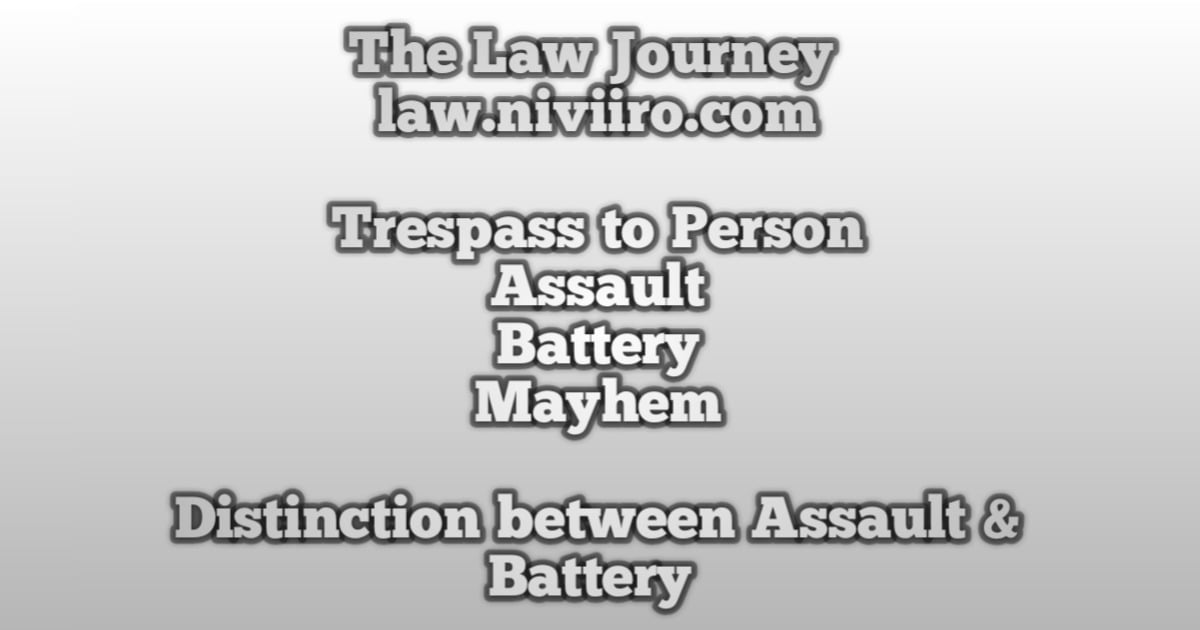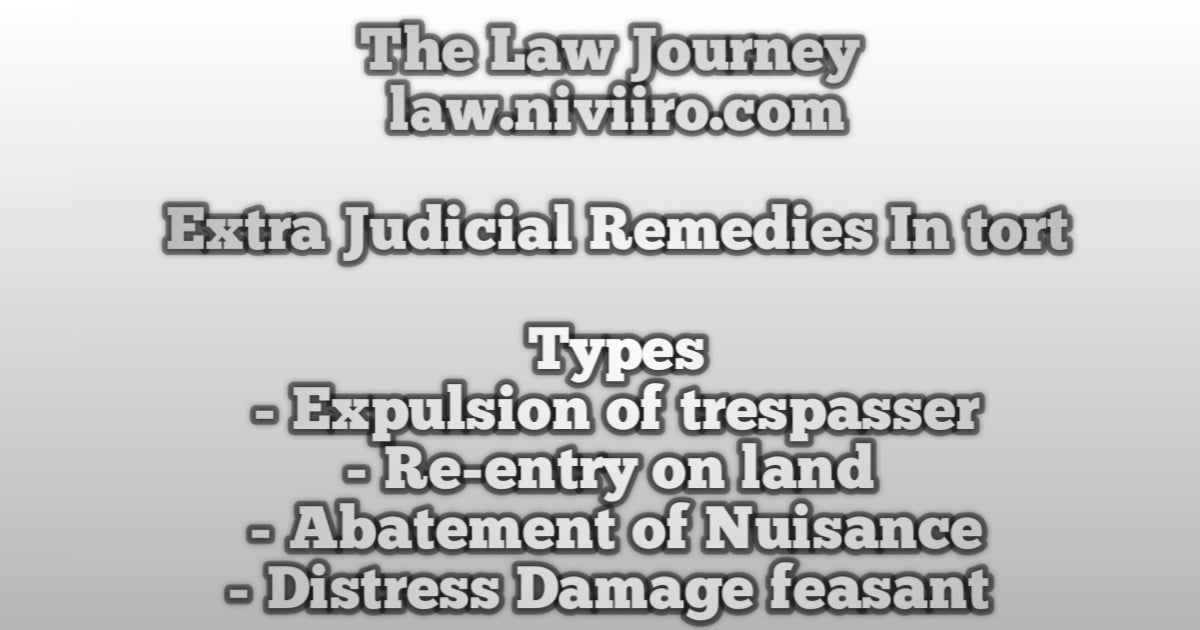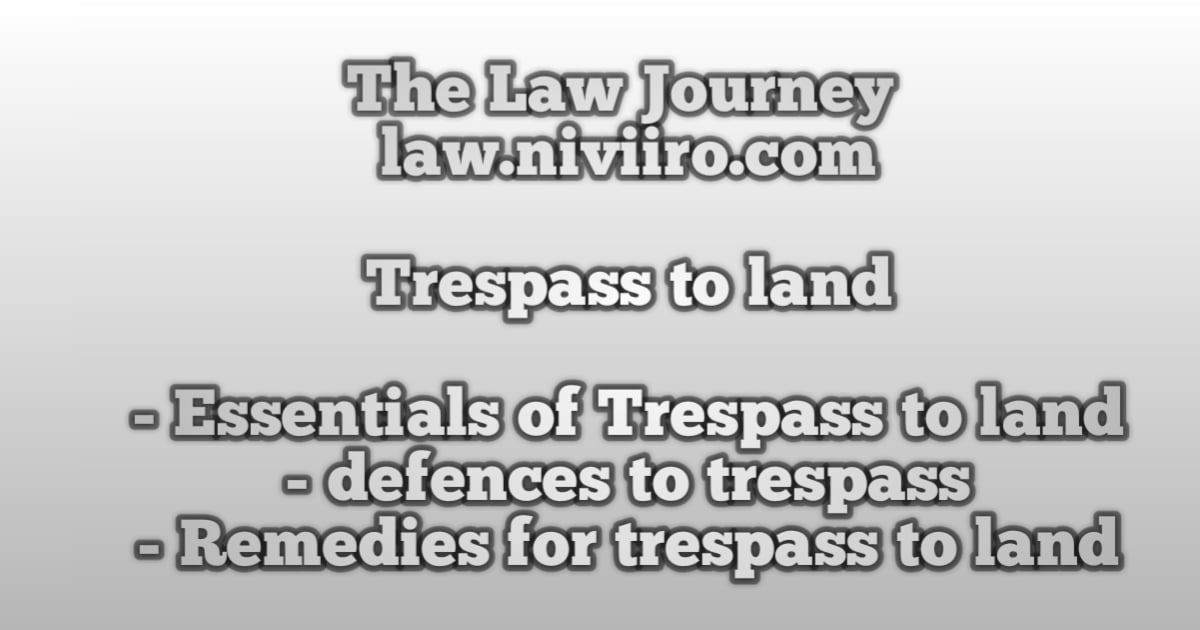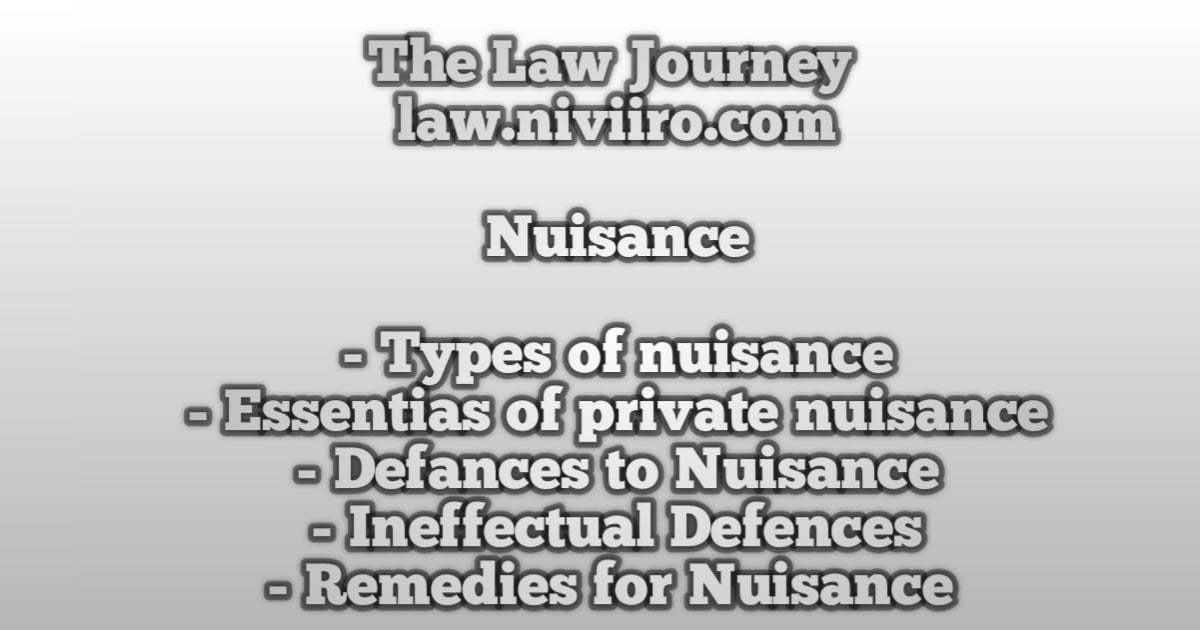Any direct infringement of a protected interest resulting from a positive conduct is actionable if justified. Trespass to person refers to wrongs that damage someone’s personal safety and freedom. It can be perpetrated both negligently and maliciously. If the invasion is direct but predictable, or if the invasion is the result of an omission rather than a positive act, there may be no culpability for trespass, but there may be liability for some other conduct.
There are four forms of intentional trespass to the person as follows-
(i)assault, (ii) battery, (iii) mayhem, and (iv) false imprisonment.
Assault
An assault is defined as an unlawful effort to cause bodily or corporeal harm to another, together with the evident present capacity and purpose to do so. We may have a better understanding by looking over the observations in the following circumstances;
Stephens v Myers, 4 C & P 349 (1830), The plaintiff presided over a parish meeting. The defendant, who sat seven seats away on the same table, became belligerent, prompting a motion to expel him. The defendant then stated that he would rather pull the plaintiff out of the chair, and he rushed towards the chair with his fists clinched against the plaintiff, but he was stopped. The defendant was found guilty of assault.
In contrast, in Bavisetti Venkata Surya Roa v Nandipati Muttayya (AIR 1964 AP 382), the defendant, a village Munsiff, threatened to confiscate the plaintiff’s ear-rings in order to recover land tax. The local goldsmith was summoned, and someone paid the land revenue on behalf of the plaintiff, after which the defendant discreetly left. Because the defendant said nothing following the arrival of the goldsmith, it was determined that the plaintiff was not put in fear of immediate or immediately violence, and hence the defendant could not be held liable for assault.
Battery
The term “battery” refers to the use of force, either directly or indirectly. It may also be described as the intentional use of force against someone without any legal reason. If someone uses force in an angry or vindictive manner without legal basis, this is referred to as ‘battery.’
There are two things necessary to constitute a battery-
- There should be use of force.
- The same should be, without any lawful justification.
- Use of Force
In Morris v. Marsden (1952) 1 All ER 925, the defendant, who was suffering from a mental illness, attacked the plaintiff, inflicting him some injury. The defendant was aware of the nature and quality of the conduct, but he was unaware that what he was doing was illegal. In a damages suit for battery, it was determined that the defendant was responsible for damages since he recognised the type and character of his tortious act.
The plaintiff in Pratap Daji v. B.B. & C.L. Rly., 1875 (1) Bom 52, boarded a carriage on the defendant’s railway without purchasing a ticket. When asked for a ticket at the next station, he declined. He refused to get out of the carriage again after some time had passed. He was then violently taken from the carriage. The plaintiff sued the defendant for action, and the Court determined that the use of force was lawful. Because he was a trespasser (without holding a valid ticket to travel in). As a result, the defendants were not held liable.
Defence against Assault & Battery
There are below some particular instances mentioned where defences are available against assault and battery:
(a) Expulsion of trespasser-If someone enters another person’s property without permission and refuses to leave even after a request, he can be evicted with force to the extent necessary, and in such a case, the force used is justifiable.
(b) Lawful correction-Assault and Battery may be justified as remedial measures. Correction of a student, youngster, or soldier However, corrective actions should not be unreasonable or excessive.
(c) Retaking of Goods-If a person wrongfully takes possession of someone else’s property, the rightful person (owner) or someone authorised to take care of the owner’s property may request to have his property returned, and if the wrongdoer refuses to give in, the owner or authorised person may use reasonable force as he deems appropriate in the circumstances.
(d) Preservation of public peace-If someone is endangering the public peace or producing a disturbance in a public worship site, he can be stopped by using reasonable force.
(e) Statutory Authority-If a legal authority is conducting his duty and someone interferes and prevents him from performing his duty, the person may be stopped using force.
Distinction between Assault and Battery
| Assault | Battery |
| 1. Action which puts another person in instant fear of unlawful force | 1. Use of unlawful force |
| 2. Actual contact is missing | 2. Actual contact is necessary |
| 3. To throw water on someone is assault | 3. To throw water on someone and if drops fall on him, is battery |
| 4. Generally assault precedes battery | 4. Every battery should include assault |
Mayhem or Maim
Mayhem is another type of violence in which bodily harm is severe enough that a person is unable to fight or protect himself.
Mayhem is defined as the act of cutting off, disabling, or weakening a man’s hand or finger, knocking out his eyes or foretooth, or castrating him. However, cutting a man’s ear, nose, hair, or rear teeth is considered battery.
Related Post
What do you mean by Trespass to person ?
Trespass to person refers to wrongs that damage someone’s personal safety and freedom. It can be perpetrated both negligently and maliciously.
Meaning of Assault ?
An assault is defined as an unlawful effort to cause bodily or corporeal harm to another, together with the evident present capacity and purpose to do so.
What is the meaning of Battery ?
The term “battery” refers to the use of force, either directly or indirectly. It may also be described as the intentional use of force against someone without any legal reason. If someone uses force in an angry or vindictive manner without legal basis, this is referred to as ‘battery.’
Distinction between Assault and Battery ?
1. Assault reffers to Action which puts another person in instant fear of unlawful force whereas battery means Use of unlawful force.
2. In assault Actual contact is missing whreas in battery Actual contact is necessary…
Meaning of Mayhem ?
Mayhem is another type of violence in which bodily harm is severe enough that a person is unable to fight or protect himself. Mayhem is defined as the act of cutting off, disabling, or weakening a man’s hand or finger, knocking out his eyes or foretooth, or castrating him. However, cutting a man’s ear, nose, hair, or rear teeth is considered battery.
Reference
- Law of Torts by Ratanlal and Dhirajlal
- Universals Law of Torts
- P.S.A. Pillai’s – Law Of Tort
- Law of Torts by RK Bangia (22nd Edition)
- Law of Torts by J.N. Pandey
- A.K Jain law of torts

















